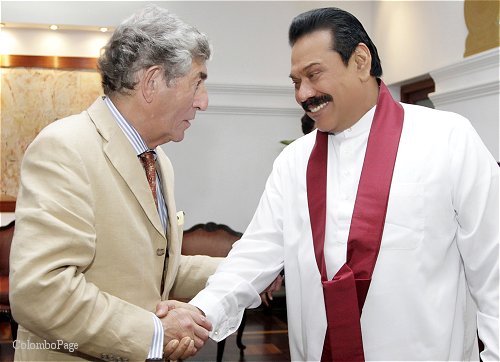 |
The Vice-Chairman of the British-Sri Lanka Parliamentary Group, Baron Dennis Rogan, has declared that the militarisation of the north was not as bad as often portrayed and that he had no issues talking to ordinary citizens in all regions, after a seven-day visit to the island.
"During my visit to all parts of the country, North, East, South, and West I was able to speak freely and openly with ministers, government officials, religious leaders, and most importantly ordinary citizens from all sections and walks of life. What struck me particularly was that the military presence in the North was substantially less than what has been often portrayed," the Ulster Unionist Party peer told the president, Mahinda Rajapakse, during a meeting with him and Chris Nonis, the Sri Lankan ambassador to the UK.
"Sri Lanka must be recognized as a country coming out of an armed conflict spanning a thirty year period which cost around 100,000 lives. Since 2009 much has been achieved in Sri Lanka - the government has policies to achieve more. I was happy to note that there is religious and ethnic harmony," he further said.
"I found that peace has descended on this pleasant land and that development and prosperity are continuing to grow a pace. Having lived in Northern Ireland during our troubles, I know how easy and wrong it is for outside commentators to make snap judgments (often-on poor and wrong information) on the situation in our two countries. We suffered because of this - as you are doing today. Commentators from the outside world should realize it takes time, energy and commitment to achieve the ideals set out by the Sri Lankan Government,
"The Sri Lankan President, Government, and Peoples must be given both space and patience by the outside world to fulfill their plans. The forthcoming CHOGM Conference is a golden opportunity for the peoples of Sri Lanka to show the true picture of life in their post-conflict country. Dialogue and Diplomacy are fundamental to the way forward for lasting peace and prosperity; thankfully I have experienced many examples of both," said Rogan.
The UN High Commissioner for Human Rights Navi Pillay also recently concluded a visit to the island and a statement by her office said:
“Four years since the end of the war, the military presence in the north remains considerable. The High Commissioner received information that a number of military checkpoints and barriers were removed just before her arrival and reinstated after her departure.”
“She raised several emblematic cases [of threats to freedom of expression] with the Government, but did not receive any satisfactory responses. This concern was unfortunately borne out during her visit by reports that people in villages and settlements she visited in the Mullaitivu area were visited by police or military officers before and after her arrival. In Trincomalee, people she met were subsequently questioned about the content of their conversation.”
